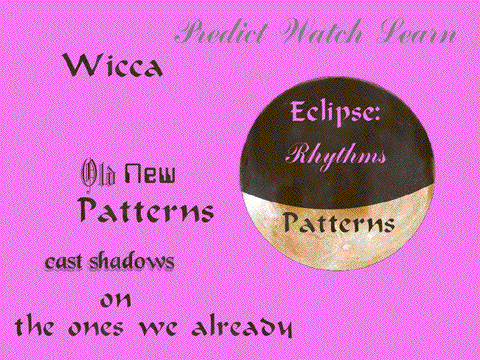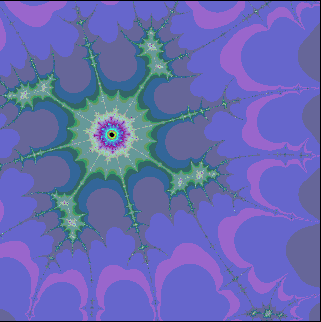

We do like our world knowable, predictable. If we were content to state
that there is a God but delve no further than that into the nature and meaning
and implications of such a God, there would be no religion, and if we were
comfortable with referring to Nature without studying the laws and properties
thereof, we would have no science, either.
One of the oldest conceptual traditions of the witch-religion is the image
of the cycle as a symbol of knowledge and mystery. The moon, with its phases,
is heavily associated with this. An even more powerful image of this sacred
concept is the eclipse. Consider! If you started out knowing nothing (as
we all do, of course), but then learned, perhaps from your own observations
or perhaps at the side of a teacher who shared with you this knowledge,
of how the moon waxes to fullness and then wanes to a crescent and disappears,
only to be reborn anew, you might feel confident that you understood the
moon's behavior. You would be able to predict its behavior in the sky from
your knowledge of its patterns. Then along comes a total eclipse of the
moon, which you could not have predicted from the state of your wisdom,
and which might well upset your confidence that the behavior of the moon
is so dependable and predicable after all!
Of course, the eclipse is equally predictable to those who observe longer
and watch the rhythms and cycles that unfold over a much longer period of
time. So hold in your mind for a moment the image of people the world over
at many different levels of understanding of the world they live in, and
its patterns. At each level of understanding, there are things understood
and known, and other things that are not only not understood and not
yet known but which in fact actually contradict or disrupt those lower-level
understandings, at various times and places or under various circumstances
and conditions.
Western science deserves considerably more credit than the western religious
outlook would give it for its approach to the unknown; the scientific method
approach, with its willingness to begin from a place of acknowledged ignorance
with as few assumptions as possible, shows a respectful humility towards
the complexity of creation that contrasts favorably with the scripture-thumping
zealotry of western orthodoxy. But western science nevertheless deserves
less credit than it has often been inclined to grant itself. The professed
ignorant point of entry has been mainly procedural, while the spirit of
western science has been more wrapped up in the belief that the scientific
method of inquiry is an invincible machine such that if you dump enough
raw observational data into its front end it will eventually yield a complete
predictive description, and understanding, of the universe. Rather than
an image in which at any level of understanding there are levels of myseries
not yet understood, the belief-system inherent in western science has been
front-loaded with the expectation of eventually being able to "get
there", to know it all, to conquer all mystery and be surprised no
more.
Some great discoveries and theorems have ostensibly disabused science of
that notion--Heisenberg's uncertainty principle in physics introduced the
concept that the very process of observing necessarily perturbs that which
is observed, while hinting that many things cannot be known because of the
unavoidable clumsiness of our avenues of observation; and "chaos",
the study of nonlinear (nonperiodic) determinism, introduced us to the notion
that patterns can be such that we can study and come to recognize in them
familiar themes, and yet remain unpredictable because the patterns do not
repeat themselves with cyclic periodicity.
Here, for example, are two views of a famous and beautiful fractal pattern
called the Mandelbrot set, which repeats itself with endless variations
as you zoom in closer and look into its structures; after awhile, its overall
motif would become sufficiently familiar that you would generally recognize
what you saw as "Oh, this is from the Mandelbrot set"; but you
would never be able to predict accurately how any region would look at this
or that magnification until you went to look.

view 1

view 2
As a witch, you learn reverence for ignorance as well as for wisdom; you
learn that even if you lived infinitely long and learned infinitely much
about the universe, you would remain ignorant of an infinite amount that
you had yet to learn.
In the Christian religious tradition, there is a story about some artisans
who threw away a stone to get it out of their way so that they could build
a temple; but the Master Builder picked this very stone, this discarded
stone, and stated that it would be the cornerstone of the new temple, the
foundation upon which it would be built. If you have heard this story related
within a Christian context you have most likely heard
it said that the meaning of the parable is that Christ (i.e., Jesus
of Nazareth) was the cornerstone.
I will tell you now that the true cornerstone which is perpetually discarded
by those trying to build a temple (i.e., a religion, or a science, an approach
to understanding God / Nature) is fallibility, our capacity to be in error--not
merely our condition of ignorance on some matters, but also our propensity
for "knowing" things that ain't necessarily so. Religious institutions
are what they are because ignorance is frightening and fallibility all the
more so, and a source of unimpeachable authority--"knowledge handed
down directly from God"--would be so attractive. Something people could
be sure of in an unsure, unpredictable world.
But the true religion which can never have an orthodoxy, which I have designated
for the purposes of these pages as "witchcraft" although it answers
to no single name, is founded on the inescapable fact of our human fallibility
as its cornerstone.
If one begins with the sacred centrality of the fact of fallibility, then
in asking how to structure the relationships among people for any purpose,
one considers that the person occupying any given place in the structure
could at any given time be wrong about any given thing. No structure can
fix that, so the good structure builds upon it. The structures of the world
in which we live were largely built to hide it, to erase it, to make us
safe from it. And this is a central part of our problem.
Traditions and techniques for making observations and testing hypotheses
deserve respect as rituals which have guided us well in seeking knowledge,
but the witch does not forget that recipe-following will not produce infallible
answers, nor will rituals in and of themselves produce knowledge.
Religious ecstasy and prayer, transcendent emotion-driven intuitive leaps
of cognition, and visionary experiences deserve acknowledgment as powerful
inner fountains from which diverse data are brought together and the patterns
within them recognized, or hypotheses generated, but the witch knows that
fervor and passion and the conviction that God has personally spoken to
one do not transcend fallibility either.
In the face of these immutable aspects of our situation flies our intense
need for order, for patterns in our lives that allow our lives to feel familiar,
and at least to an extent its events and their outcomes predictable. We
cannot know how to behave if we cannot predict the results of our behaviors
and the likely behaviors of other people in our world. If it is true, as I have said that it is, that
the rigidity of Orthodoxy froze us in destructive patterns that could destroy
the entire species if we were not to loosen ourselves from them, it is also
true and often noted that we now live in a period of relative anomie, when
there is such a limited set of values and beliefs that we share and expect
others to share that we have lost much of our ability to predict each others'
behaviors--"anything goes"--and we fear each other more every
day because of this.
We need new values, morals for a new social order, definitely. But they
will not come from an old book and they will not come from a new book either;
to return to the rigidity of Orthodoxy would accomplish nothing but our
own demise, regardless of whether the content of that Orthodoxy were new
or the same set that we have been wriggling loose from for the last couple
centuries.
By beginning with fallibility as our cornerstone and planning any process
of arriving at those values around that cornerstone, we set the stage for
the patterns we need and crave to emerge.
Order emergent. Order that arises from our interaction and our communcation.
Order that depends on our separate recognition of its patterns for its dependability
to us. These things I propose to you are the results of being witch-people
together. This is our temple. We need impose no creed or promote any complex
system of beliefs and values, perhaps not even beliefs and values about
human fallibility, for practice is more compelling than proselytization
in many things.
Wisdom is as light and its Source shineth of its own accord.